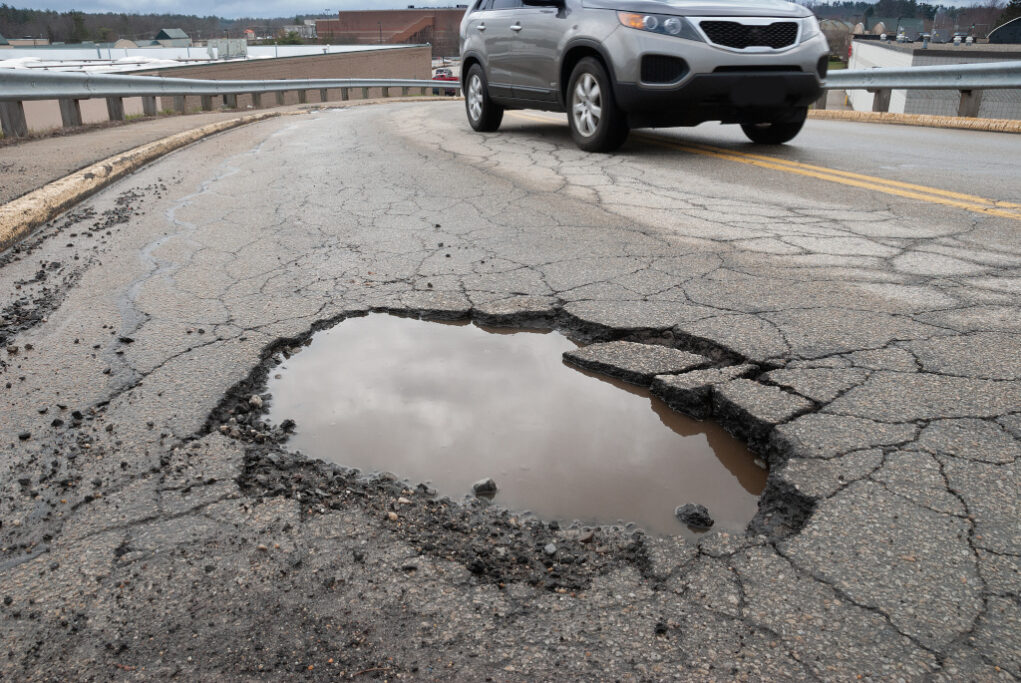Every driver knows that terrible feeling when you’re cruising down the road and a thud rattles your car (and you) around. You’ve just hit a pothole. Many thoughts might fill your head after this. You may wonder how you didn’t see it, or worse, if your car is damaged.
Some potholes can cause severe damage to several parts of your vehicle, including your tires, wheels, suspension, and more. If bad enough, the damages could add up quickly.
Luckily, if your car takes damage from a pothole, your insurance policy will cover it. In this article, we’ll explain more about how collision coverage pays to fix your car if it takes a pounding while driving on a poorly maintained road. This includes answering some frequently asked questions. We’ll also explain the types of damage potholes can do.
Collision Coverage and Potholes
Collision is an optional auto insurance coverage that covers all damages that occur when you collide with other cars or objects, such as trees or light poles. This also includes potholes. It’s also an important component of full coverage, which also includes liability and comprehensive.
You’ll need to pay your deductible if you file a collision insurance claim. After that, your insurer will take care of the rest. You must have collision coverage if you want reimbursement for pothole related car repairs. If you have a liability-only policy, be aware that you’ll have to pay for all repairs out of pocket.
How Potholes Damage Cars
While they appear like little craters in the pavement, potholes can deal some nasty damage to your car. Some of the most common types of damage your vehicle can take after hitting one are:
- Punctured or flat tires
- Bent, dented, or cracked wheels
- Lost hubcaps
- Misalignment of steering systems and suspension
Serious damages usually occur if you go over a pothole at a high speed or if the hole is deep enough. You might also be at risk of damage if you already have low tire pressure. This makes it easier for punctures to occur, especially if there was enough force when you hit the pothole.
Checking for Damage
It can be easy to shrug off hitting a pothole. However, it’s vital to check for harm to your car as soon as possible. Some damages, such as to your suspension or wheel alignment, might take a while to notice. If you can find damages earlier, you can ensure your car is safe to drive and get it the repairs it needs.
Here are some ways to look for damage if you’ve just hit a pothole and have a sinking feeling that it hurt your car:
- Bulges or holes in your tires
- The Tire Pressure Monitoring System (TPMS) warning light on your dashboard is on
- Your car pulls to one direction while driving
- Dents or bends on your wheels
- Your car vibrates more than it used to
If you notice any of the above, you should take your car in for a professional inspection. A mechanic will be able to definitively tell you about any damage, how bad it is, and how much it might cost to fix it. This will help you know whether you should report a claim to your insurance company.
Filing Pothole Damage Claims
It’s a good idea to file a claim with your auto insurance provider after hitting a pothole if you think the damage is bad enough. Of course, it only makes sense if the repair costs would be more than your deductible. If the damages were less than your deductible and you filed a claim, you’d be parting with far more money than you’d need to. In other words, it’s probably not worth filing a claim if the incident or damage was minor and you could easily deal with it or pay to fix it.
As an example, imagine you have a $300 collision deductible. If you ran over a pothole and later see that your tires have been punctured or something on the underside of your car has taken damage, you’ll likely need repairs that cost more than your deductible. Making a claim would be a good idea in this case because you can avoid paying out-of-pocket.
Ultimately, you’ll have to make a judgment call on whether you want to file an pothole insurance claim. As we mentioned earlier in the article, it’s smart to take your vehicle to a shop to find out how much it would cost to repair the damages. If the damages are more expensive than your deductible, then it’s probably wise to just file a claim and get the proper repairs.
Information to Have Ready
Filing a claim a very straightforward process. If you’re planning on telling your insurance company about the pothole incident, it’s a good idea to document as much as you can about it so that they have enough info to approve your claim. This typically involves:
- Photos and notes of all the damage to your vehicle related to the incident
- Writing down the location and time of day
- How fast you were going when you ran over the pothole
Once you have all your ducks in a row, you can contact your insurer. Tell them everything you know about the incident and try to be as detailed as possible. Then, follow any instructions they give you.
Does Filing a Pothole Claim Raise My Premium?
One claim for hitting a pothole and taking some damage is unlikely to make your car insurance rates go up very much. However, keep in mind that some insurers, per Progressive, might consider you to be at fault for the incident since it only involves your car. In this case, your premium will probably increase.
Your provider may also increase your insurance premium if you have a history of filing lots of claims. But even though your recent claim history is a major rate factor, many other aspects go into your monthly prices. This includes personal details such as:
Does the City Carry Responsibility for Pothole Damages?
Depending on where you live, your city might compensate you for damages to your car sustained by potholes. In Chicago, for example, you can try to get reimbursement through the City Council if you hit a pothole. You might also be eligible for damage compensation if you live in New York state, per the Insurance Information Institute (III).
Before making a claim with your city for pothole damage, consider that it might be more difficult or drawn out than contacting your insurance company. You’ll likely have to gather several bits of information, such as repair receipts or quotes, as well as complete a claim form. This might vary by your jurisdiction.
In some cases, you may even have to prove that the city knew about the pothole to make your case. And, as Nolo points out in an article about compensation for pothole damage, you must show that the city didn’t adequately repair the road, despite having a reasonable amount of time to do so.
Frequently Asked Questions
How can I avoid hitting potholes?
Running over potholes is sometimes unavoidable, especially when you’re driving at high speeds or in the dark. Even so, here are some quick tips you can use to avoid those pesky little holes in the ground and the damage they cause:
- Drive the speed limit. Your risk of hitting potholes increases once you’re speeding. Try to go the posted limit so you can see a pothole and get out of the way.
- Maintain good tire pressure. Low pressure makes your tires more likely to get punctured or have problems after running over a pothole. Periodically check your tire pressure and pay attention to the TPMS light on your dashboard.
- Keep your distance from other cars. If you’re following a car closely, you might not be able to see the pothole it just went over. Try to widen your distance so you can avoid going over bumps or holes.
- Slow down before hitting the pothole. If you spot a pothole but can’t avoid it, try slowing down to lessen the impact of hitting it. Grange recommends braking first and then coasting over it to protect your car from damage.
How do I know if my car is ok after hitting a pothole?
We all know the feeling of hitting a pothole pretty hard and hoping our car isn’t damaged. If you suspect it’s damaged, look for dents in your wheels, holes in your tire’s sidewall, or other irregularities such as your car pulling to one side. Also, be on the lookout for new vibrations or a bumpy feeling while driving after going over a pothole.
To be sure if your car has taken damage, you might want to just take it in and have a professional look at it.
Does full coverage protect my car if it’s damaged by a pothole?
You can file a car insurance claim for pothole damage if you have full coverage. This is because it includes collision, which handles any damage caused by potholes.


